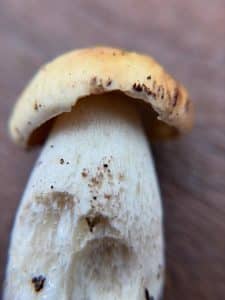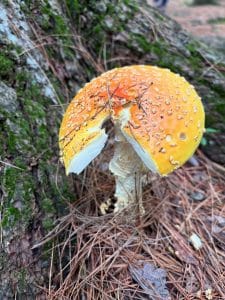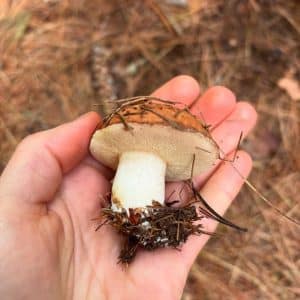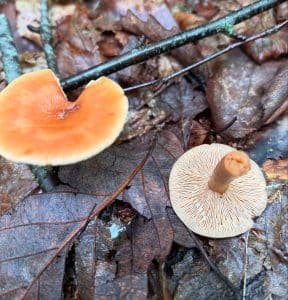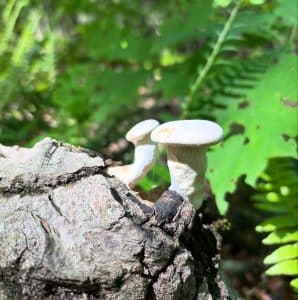Excerpted from Mushroom Wanderland: A Forager’s Guide to Finding, Identifying, and Using More Than 25 Wild Fungi. Copyright (c) 2021 by Jess Starwood. Used with permission of the publisher, The Countryman Press, a division of W. W. Norton & Company, Inc. All rights reserved.
Mushrooms have garnered the attention of humans for as long as we have walked the earth. Their mysterious and transient nature has captivated various cultures into speculating if fungi possess magical powers. People have used mushrooms as talismans, or taken them as a remedy for a vast range of ailments. But are they food or are they medicine? Undoubtedly, they’re both. As we’ve seen, adding some fabulous fungi to one’s diet increases micronutrient intake and valuable levels of different vitamins. But mushrooms may also enhance our immune systems.
Medicinal mushrooms have been a controversial hot topic among scientists and alternative practitioners alike. Some say they are nothing more than a sugar pill with no side effects while others claim these mushrooms cure all that ails under the sun. Countless studies have been done on many different long-used mushrooms with enough evidence to conclude that more research is warranted.
Evidence from many studies has indicated that fungi are helpful to the immune system in a very unique way. While our body’s immune system is designed to fluctuate over time and adapt to environmental stressors, it doesn’t always work that way. Sometimes the body’s self-defense mechanisms don’t always step up to the plate like they should, or in autoimmune diseases, they work too hard and the slightest disturbance can cause a problem. But mushrooms have been shown to modulate the immune system as it is, bringing it back into balance from either extreme. This unique quality of mushrooms, with little to no side effects, shows potential in addressing issues that are not easily treated with pharmaceuticals, which come with their own list of side effects. Our bodies are designed to fight off disease, but sometimes they need a little help from our fungal friends.
While some are skeptical about the use of mushrooms as panaceas in alternative medicine, fungi play a crucial role in modern medicine, given that they are the basis of many important pharmaceuticals, from the antibiotic penicillin to cholesterol-lowering statins, such as lovastatin, and even anti-cancer drugs such as paclitaxel (Taxol). They even serve us in antifungals, antivirals, and immunosuppressants. Many mushrooms have been studied for their anticancer and tumor-suppressant properties and are often used in conjunction with radiation treatments to mitigate the effects of chemotherapy.
One of the most significant compounds found in mushrooms is the polysaccharide group, a type of carbohydrate made up of bioactive beta-glucans, which are responsible for most of their medicinal qualities. These compounds are also considered prebiotics, feeding the beneficial microbiota that reside in our digestive systems. These digestive bacteria are also a crucial part of fighting disease, properly digesting foods, and producing important B vitamins, riboflavin, and vitamin K. Maintaining a healthy microbiome has also been shown to play a role in improving neuro-psychiatric disorders such as autism, anxiety, stress, and depression. In addition, many autoimmune diseases are connected to a dysfunction of the microbiome.
Given the myriad ways in which they can help improve our health and well-being, occasionally adding mushrooms to your daily diet could help create a balance in your immune system. And if it turns out mushrooms don’t quite live up to the hype of being medicinal cure-alls, edible mushrooms can, at the very least, make a fabulous meal and offer new culinary avenues to explore.
As science continues to examine and study fungi in their vast and far-reaching uses, there has been a resurgence of interest in the role of psychedelics in medicine. As neuroscience advances to better understand the workings of the human brain, psilocybin-containing mushrooms are moving to the forefront of research on neurological treatments. Pharmacological treatments have been largely ineffective for many psychological disorders such as treatment-resistant depression, anxiety, PTSD, addiction, anorexia and end-of-life transitions.
But, as science is finding out, and maybe as shamanic tribes have known all along, the person suffering from these conditions is often unable to shift out of a negative thought cycle and into positive actions. Yet, studies on psilocybin treatment are showing that it may be possible to rewire the neurons in the brain, creating new connections, instilling a new perspective on the world, and helping the patient break through old thought patterns. Combined with mindfulness, a physician’s approval, and the guidance of a therapist, psilocybin can be a powerful and effective tool for our most common health issues. It is important to note that the use of psilocybin treatment is illegal in some countries and certain areas of the United States, and it can be dangerous if used under inappropriate conditions; you will need to do your research (and seek appropriate professional advice) before you introduce any form of psychedelics in your diet. That said, just as other medicinal mushrooms help rebalance our immune systems, psilocybin mushrooms may help to rebalance our psychological state of mind as well, bringing us back to a feeling of centeredness and connection to the universe.
Many of our readers find that subscribing to Eat The Planet is the best way to make sure they don't miss any of our valuable information about wild edibles.
See our privacy policy for more information about ads on this site

